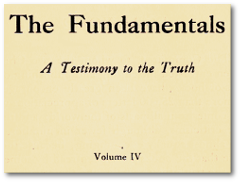Can a Progressive’s ‘Inclusive Values’ Include Christianity?
Body
A mayor’s backlash against a basic statement of Evangelical Christian belief signals an ominous turn in the culture wars. National Review
As iron sharpens iron,
one person sharpens another. (Proverbs 27:17)
A mayor’s backlash against a basic statement of Evangelical Christian belief signals an ominous turn in the culture wars. National Review
“The centuries-long debate between conservatives and progressives about governance, argues Michael Munger, is essentially a disagreement about a simple concept: whether the State is a unicorn.”
“Diversity. Tolerance. Open-mindedness. These values have been the benchmarks of American liberalism, until recently.”
HT: Acton Institute
 [node:22019 collapsed body]
[node:22019 collapsed body]
CHAPTER III THE BIBLE AND MODERN CRITICISM
BY F. BETTEX, D. D., PROFESSOR EMERITUS, STUTTGART, GERMANY
TRANSLATED FROM THE ORIGINAL GERMAN BY DAVID HEAGLE, D. D.
Discussion